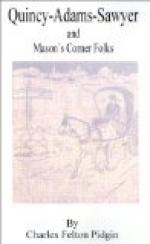His father had known Isaac Pettengill, and in fact had conducted many successful suits for him; besides this he had drawn up the papers when Uncle Ike divided his fortune. Quincy’s father had written to Uncle Ike, asking him to find his son a boarding place, and Uncle Ike had selected Deacon Mason’s as the best place for him.
Quincy’s father had told him to be sure and get acquainted with Mr. Isaac Pettengill, saying he was a man of fine education, and added, “I sometimes feel, Quincy, as though I would like to go into the country and take care of a chicken farm myself for a while.”
His mother came of the best New England stock, and although she had been named Sarah and her husband’s name was Nathaniel, we have seen that the son had been endowed with the rather high-sounding name of Quincy Adams, which his schoolmates had shortened to Quince, and his college friends had still further abbreviated to Quinn. Quincy had two sisters and they had been equally honored with high-sounding appellations, the elder being called Florence Estelle and the younger Maude Gertrude, but to pa, ma, brother, and friends they were known as Flossie and Gertie.
The next day after the affair at Hill’s grocery, Quincy put several of the best cigars in town in his pocket and started towards Eastborough Centre for a walk, intending to call upon Uncle Ike Pettengill.
The young man knew that late hours and their usual accompaniments were what had undermined his health, so he determined to make his vacation of good service to him and recover his accustomed health and strength, and when he returned home cut his old acquaintances and settle down earnestly and honestly to the battle of life.
He had teen a favorite in city society; he was well educated, well read, had travelled considerably and was uniformly polite and affable to all classes, from young children to old men and women; he was very careful about his dress, and always had that well-groomed appearance, which in the city elicits commendation, but which leads the average countryman to say “dude” to himself and near friends when talking about him.
Quincy was no dude; he had been prominent in all college athletic games; he had been a member of the ’varsity eight in one of its contests with Yale, and had won a game for Harvard with Yale at base ball by making a home run in the tenth inning on a tied score. He was a good musician and fine singer. In addition he was a graceful dancer, and had taken lessons in boxing, until his feather-weight teacher suggested that he had better find a heavy-weight instructor to practise on.
Quincy was in his twenty-third year. He had been in love a dozen times, but, as he expressed it, had been saved from matrimony by getting acquainted with a prettier girl just as he was on the point of popping the question.
But we left him walking along on his way to Eastborough Centre. Deacon Mason had told him Uncle Ike’s house was away from the road, some hundred feet back, and that he could not mistake it, as he could see the chicken coop from the road. He finally reached it after traversing about a mile and a half, it being another mile and a half to Eastborough Centre.




